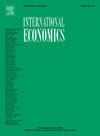与俄罗斯的贸易脱钩
引用次数: 1
摘要
我们使用一般均衡贸易模型来量化与俄罗斯脱钩的福利成本。我们发现,西方对俄罗斯进出口的非关税壁垒增加一倍,将使俄罗斯的福利减少4.8%,对西方福利的影响相对较小。我们表明,脱钩的福利成本被供应链放大,对俄罗斯能源(尤其是石油)的限制在数量上很重要。最后,我们发现,在2022年俄罗斯入侵乌克兰之后,西方实际实施的限制所产生的福利损失约占脱钩情景中所获得的福利损失的80%。本文章由计算机程序翻译,如有差异,请以英文原文为准。
Trade decoupling from Russia
We use a general equilibrium trade model to quantify the welfare cost of decoupling from Russia. We find that a doubling of non-tariff barriers imposed by the West on Russian imports and exports of all goods would decrease Russian welfare by 4.8% and would have a relatively small effect on Western welfare. We show that the welfare cost of decoupling is amplified by supply chains and that restrictions on Russian energy, especially oil, matter quantitatively. Finally, we find that welfare losses generated by restrictions actually applied by the West in the aftermath of the 2022 Russian invasion of Ukraine account for around 80% of those obtained in our decoupling scenario.
求助全文
通过发布文献求助,成功后即可免费获取论文全文。
去求助
来源期刊

International Economics
Economics, Econometrics and Finance-Economics, Econometrics and Finance (all)
CiteScore
6.30
自引率
0.00%
发文量
74
审稿时长
71 days
 求助内容:
求助内容: 应助结果提醒方式:
应助结果提醒方式:


